



Toronto’s Indie Live Music listings for Blues/Folk/Roots/Country/East Coast/Jazz++
Don’t forget to BOOKMARK this page. Come back again and watch us grow!
All listings are free.
See Contact Us




Jay Douglas celebrates 40 years
by Lisa McDonald
Live Music Head
May 2011
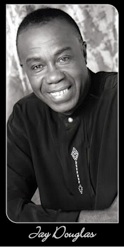
Jay Douglas first took to the stage over 40 years ago
in his hometown of Montego Bay, Jamaica.
As a young singer,
Mr Douglas learned the tools of the trade in local talent shows
and by performing on stages with now-legendary musicians
Desmond Dekker, the Blues Busters, Alton Ellis,
Derrick Morgan and Jimmy Cliff.
And when his family immigrated to Canada in 1963,
it didn’t take long before Douglas was fronting
an R&B band called The Cougars;
club fixtures in Toronto’s heyday of the 60s and 70s.
Over the years,
Jay has performed at Roy Thompson Hall,
headlined at the Canadian National Exhibition,
and appeared on many television programs
including Breakfast Television and Canada AM.
Mr Douglas has even shown his talent as an actor,
in a motion picture starring Omar Sharif.
Along with his AllStar Band,
Douglas has appeared at music festivals in Quebec,
Montreal, Ottawa, Calgary and Vancouver,
and performed at the Toronto Blues Society's Caribbean Soul concert.
A featured performer at night clubs, resorts, and hotels such as
the Hilton, Ramada, and Holiday Inns,
Jay has also held long-running engagements at
the Sheraton in Hong Kong, The Matsuri in Japan,
and aboard cruise ships.
NOW Magazine dubbed Jay Douglas Toronto’s Best R&B Singer in 2006,
and the same year,
Seattle-based record label Light in the Attic
solicited Douglas for his music and knowledge
in the creation of the CD compilation,
Jamaica to Toronto (soul, funk and reggae 1967-1974)
which features two tracks by The Cougars.
The cd release party for the Jamaica to Toronto project
was a huge success with a show at Toronto’s Harbourfront Centre.
In 2006,
Jay Douglas and his All-Star Band also performed
at the Jazz on the Green festival in Kingston, Jamaica.
Jay has shared stages and/or backed up the likes of
Fats Domino, Percy Sledge, Burning Spear, Toots and the Maytals,
and he’s worked with Pee-Wee Ellis,
James Brown's musical director.
He performed at a tribute to Donovan Bailey,
following Bailey's record breaking run at the Atlanta Olympics,
and the 21st Annual Canadian Reggae Music Awards
chose Mr Douglas as their Top Male Singer for 2007.
And in 2010, Jay went to Cuba and took part
in the prestigious Havana International Jazz Festival.
Jay Douglas continues to perform everywhere today,
including weekend gigs at the Snug Harbour Restaurant in Mississauga,
a gig he’s held for the last eleven years.
With several recordings already under his belt,
this seasoned performer just released Lovers Paradise,
a CD now experiencing rave reviews in Europe,
with a cover of Leonard Cohen’s Hallelujah.
On May 15, 2011,
the life of Jay Douglas and his music
will be honoured with a tribute show at Toronto’s Royal Cinema.
Celebrating Jay will feature special guests
Ernest Ranglin, Jackie Richardson, Joe Sealy,
George Olliver, and Grant Smith, among others.
Jay Douglas joins me now to discuss the tribute show,
the many highlights of his career,
and his deep spiritual beliefs...
You were born and raised in Montego Bay, Jamaica, a place I’ve visited a couple of times and loved. I stayed at the Seawind Beach Resort, but I don’t believe that hotel exists anymore, does it?
The Seawind is still there. I believe that’s where The Chi-lites will be playing next week.
The Chi-lites? You mean the band that does that song Have You Seen Her?
Yes.
Get out! I love that song!
(laughs) I was talking with the leader of the Chi-lites only last week, on a three-way line in Chicago. There may be something happening between me and the Chi-lites.
“Have you see her... tell me have you seen her? WHY, OH WHY, did she have to leave and... go away?!” I can barely stand how much I love, love, love that song! But what about Jay, tell me about you and growing up in Jamaica.
(laughs) Well as you know, Jamaica got their independence in 1962, but before that we were part of the British Colony. And when I was a kid, music was part of the curriculum in schools. In primary school after lunch, we’d go outside and sing under the mango tree. The teacher would come up to each of us and put their ear to our mouth and make sure we were singing in key. (laughs) Music was a way of life. Before long I was in junior choir at church, and the next thing was talent shows, what they call American Idol today. And believe you me, if you weren’t really good, the judges at the Jamaican talent shows weren’t afraid to chase you off the stage either. (laughs)
So you sang under the tree, sang at church, and then had them falling in love with you at the talent shows?
Loved me yes, and I’ve never looked back. (laughs) There was a friend of mine in school and we were a duo. His name was Errol, but he didn’t follow through. He regrets it today. He calls me from Jamaica and you can hear it in his voice... how he wished he’d stayed with the music, you know? But that’s the way life’s journey is.
So how old were you around the time of singing in talent shows?
7-8 years old. And when I was 12, we moved from Montego Bay to Kingston where I also made appearances.
Who were your early musical influences or heroes?
My great-grandfather used to sing in the church choir. He was a tenor, a great singer. And my grandfather too, a baritone. Montego Bay was exposed to the North American music coming in from Miami and by the tourists. We listened to WINZ on the radio at night and heard the Drifters, the Platters, BB King, you name it, we heard it all.
And when you performed shows in Jamaica, was it at festivals or theatres?
Theatre-style. And oh lord, it was like going to the Apollo! You had to be ready. (laughs)
And were you ready?
Had to be. And I would never change that basic foundation.
How did you acquire your professionalism? Did you have a mentor?
Oh man, for us to learn a song we’d go to the jukebox in the bar and put the money in. At nights, we would go to the park and sing doo-wop style. Artists like the Blues Busters, who were big stars in Jamaica, would help us with our harmonies when they were in town. We looked up to them. The Blues Busters were our role models. And Owen Grey. Oh, and we can’t forget Sam Cooke and Jackie Wilson. When the American artists came to town, it was like Christmas! We would look at the way they put on their show, and we paid attention to their professionalism.
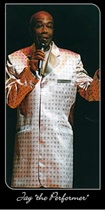
I get the feeling it’s always been about music for you.
Yes, from creation.
How did you end up sharing a stage with Desmond Dekker (singer-songwriter of the song, The Israelites)?
It was when I was doing the talent shows. Desmond Dekker was a special guest; an inspiration. It was before the Israelites came out.
And did Bob Marley have any sort of impact on you musically?
Yes, as did Higgs and Wilson, Derrick Morgan, Tony Gregory, and the Jiving Juniors. But just before I left Jamaica to come to Canada, I met Bob Marley and the Wailers in Kingston. We were both at Studio One for the same audition.
What was it like meeting Marley?
It was amazing, a-ma-zing! At the time, there were two ladies in the Wailers band. And Peter Tosh was tall, taller than all of them and the only one who could play guitar. And the lead singer at the time wasn’t Bob. Junior Braithwaite was the singer, but you could see that nothing was going to stop Bob Marley from being great. He had that drive, and you could feel his force and energy. I’m not surprised that Bob Marley and the Wailers are what they are today. I look at pictures and remember what I saw back then. When they did Simmer Down at Studio One that day, nobody wanted to hear anything else after that. They were incredible. The song was a hit from the moment they jumped off, and they were a-ma-zing!
Have you seen Bob Marley in concert?
Yes, at Maple Leaf Gardens. The Tower of Power opened. There were so many people there. I think about Bob Marley today, his message... how he never told anyone to do anything wrong or bad, or to quit. There was magic in his music, and Bob Marley was very careful about the titles of his songs and albums. He had substance.
When your family immigrated to Canada in 1963, was this the first time you had been outside of Jamaica?
Yes. My mother left Jamaica in 1953 to take a job as a domestic worker in Canada. I followed ten years later. My mom met me at the airport and said, “welcome to the real world my son”. What hit me first was coming through customs and seeing the immigration officer, seeing the uniform, being asked the questions, and the cold weather. It was Thanksgiving weekend and cold! Cold! (laughs) I told my mom I wouldn’t mind going back home. At the dinner table she gave me the phone number for Air Canada. “Here’ the number”, she said. “You call and make the reservation, but I tell you one thing, don’t get back to Jamaica and call me saying you want to come back, you hear me?” (laughs)
So you listened to your mother?
Oh, the best listenin’ I ever done! (laughs) This great country of Canada has been very good to me.
What part of Toronto did you settle in?
We settled right down here on Christie St, 166 ½ Christie St.
Is the house still there?
Yea, I drive by all the time! I used to go to Christie Pitts and play soccer. I started school at Central Tech, the largest technical school in the Commonwealth, which is not far from here at Bathurst and Harbord. I performed with a band at school, but everything really took off after a car came by the field where I was playing soccer and someone yelled out, “Hey, we want you down at the WIF Club on Sunday at mid-day, be there!” The West Indies Federation Club was at Brunswick and College. And when I showed up that Sunday, I didn’t know I was going to be auditioning for a band called the Cougars.
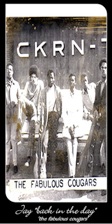
The Cougars were your first band.
That’s right. The Cougars were just starting, and looking for a singer. I was about 18 years old when I got the job.
And I understand it wasn’t long before you headed to Yorkville and the clubs of the Yonge St strip.
On the weekends I would go to Yorkville, which was called the Village at the time. And I saw bands like the Sparrows (which turned into Steppenwolf), David Clayton-Thomas, Jon and Lee & The Checkmates, George Olliver’s band Mandala, and Robbie Lane and the Disciples. But Toronto wasn’t ready for the hippies and got scared. Developers came in to Yorkville and chased everyone out.
And what about the time you spent on the Yonge St strip?
I spent time and educated my mind at Ronnie Hawkin’s place and at places like Le Coq D’or, the soul capitol. In those days, bars wouldn’t book local artists, only international artists like Parliament Funkadelic and the Commodores. But Le Coq D’or gave the Cougars the opportunity to jam at the Saturday matinee, and we did well. It was at places like that I got attached to other artists like Grant Smith of Grant Smith and the Power.
Was there a reggae community in Toronto when you were coming up?
The WIF club at Brunswick and College is where everyone would go, until it burned down, which was a big blow to the community. And there were a few record stores that were important; Monica’s, a record store and beauty shop which is still at Eglinton and Oakwood, the Ska Rock Steady, and Theo’s, which was on Bathurst across from the subway. Theo’s used to bring in the wickedest American stuff. We also went to Sir Charles record store on Harbord St.
What was the first record you ever bought?
The first record I ever bought was by the Skatalites when I was still living in Jamaica. The album is called Ska Authentic, which is a collector’s piece now. The Skatalites are the same band Bob Marley recorded with in the early days.
Do you still have the record?
Oh yea! I collect vinyl.
You have a big collection?
Oh yea! Some of the rarest pieces of music. I love my turntable and hearing all the cracklin’! You can’t beat it. I have some of the finest James Brown pieces. But you know, I’m so sorry I didn’t meet James Brown. It’s my fault.
What do you mean? You could have met him?
I should’ve. I’d been to see him and everything, but I didn’t make the effort to meet him, to get a picture with the Godfather.
Where did you see him?
Maple Leaf Gardens in the 70s.
Oh my god, that must’ve been awesome.
He did the splits and all the lights went out in the Gardens. Blew my mind! But within say three minutes, the lights came back up and there he was in a different outfit. The man was amazing, a-mazing! When I worked with James Brown’s musical arranger Pee Wee Ellis at Hugh’s Room, I said to him, “Pee Wee, I didn’t get the chance to meet James in person, and I really wished I did. Tell me something important about the Godfather that I need to know.” (in a voice imitating Pee Wee) “Well, James was very driven! He was very driven! He was very driven toward excellence, and he didn’t compromise. That’s it. He was driven!”
(laughs) I heard James Brown would dock a band member’s pay if they didn’t shine their shoes before a show.
Yea. And they all had to address each other with Mister. Respect was important. In those days it was very tough on the road, especially in the southern States, so you had to be respectful. It wasn’t easy then. A lot of challenges.
And what about radio in the early days. Did you listen to CHUM AM like me?
No, CHUM wouldn’t play my kind of music (laughs). And then when the British Invasion took over, it got worse. We tuned into WFO and WBLK in Buffalo to get soul and r&b.
Did the Cougars get airplay?
No. And I wish we’d recorded more music back then, but you can hear the early stuff of me with the Cougars on the cd, Jamaica to Toronto. The music was taken for granted before, but now it’s been re-discovered. The Jamaica to Toronto recording has become known all over the world, and it’s an important record for history.
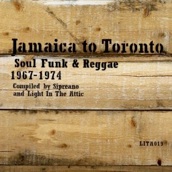
Did you and the Cougars tour in the United States?
Oh yea, we played Buffalo, Rochester, Boston, and it was interesting to work with Jackie Mittoo (original member of the Skatalites) in New York. Jackie’s a great keyboard player from Jamaica. Would you believe one of the last gigs we did was in NYC at the Waldorf Astoria?
Really? That’s the hotel where the award ceremony took place in March for the 2011 Rock and Roll Hall of Fame inductions.
Back in those days when you played the Grand Ballroom of the Waldorf, there was a camera set up on a tripod. And at the end of the night, Lisa, they gave us a huge poster of the photo they took of us on stage that captured all the people dancing. It was developed and given to us right away. But I can’t believe it was left behind on the table.
Oh no!
To this day I regret it.
What year would that have been?
1968 I think, or ’69. I think about that poster all the time.
Being that you’re a collector, I can understand why.
One of the very few that got away.
So the Cougars weren’t just a local band, you went on the road?
When there wasn’t much happening in Toronto, the Cougars went to Noranda and Val-d'Or in Quebec, eventually working our way to Montreal where we opened for Fats Domino at the Esquire show bar, one of the most renowned clubs in the world. It was the club. And we opened up for the Sweet Inspirations, whose lead singer was Cissy Houston (Whitney’s mother). When we were in the dressing room just before I was to go on stage all dressed up in my suit, Cissy Houston said to me, “Come here young man.” I replied, “Yes, miss?” Cissy says, “You ready to go on stage?” I said, “Yes, miss!” Cissy says, “Now listen, when you’re up there you have to work hard, you hear me? I mean kick some ass! Because when you’re up there you ain’t got no friends. Give it all you got, you hear me? And when you come back down, you come back down to the real world. Don’t be coming back down here carrying on like you’re still up there. But while you still up there, kick some ass, you hear!” What an amazing lady. In those days we were privileged.
The Sweet Inspirations were Elvis Presley’s back up singers.
Yes, and oh to hear Cissy sing! Amazing! A-ma-zing! The Cougars worked with many big name artists in Montreal. We also opened up for Joe Tex.
Joe Tex, the one who recorded that song I Gotcha?
Yes. And the Cougars still haven’t been paid for that show! (laughs) We didn’t get paid, but it was a great experience. In those days you had to work hard to get an applause. But Joe Tex could really dance and do all kinds of tricks with the microphone.
What was Fats Domino like?
Lots of jewellery, and what a showman, the way he pushed the piano all over the stage. He was a big man, a warm man.
You liked working in Quebec?
Everything was great until the FLQ crisis, the terrorist uprising, and Trudeau’s War Act.
I just finished reading Margaret Trudeau’s new book and she wrote about that, and how devastating it was.
The scene changed in Quebec somewhat after that, and everything started flowing back to Toronto. But entertainment in Quebec has always been on a different level. They take the business of music very seriously in Quebec. Quebec artists don’t have to go to America to become stars. Quebec makes them a star. Look at artists like Patsy Gallant, Celine Dion, and Leonard Cohen.
So how long did you tour with the Cougars?
I would say ten years. And back then it was an education watching artists like Chuck Jackson and Arthur Conley (who we backed in Toronto at Le Coq D’or), and others that you could see from Monday to Sunday. We backed Bill Medley from the Righteous Brothers, Irma Franklin (Aretha’s sister), Little Charles and the Sidewinders, oh man I could go on and on... Solomon Burke.
Where did you play with Solomon Burke?
Le Coq D’or. And he was a-mazing, a-mazing! (laughs) A-mazing!
And Percy Sledge, the one who wrote When a Man Loves a Woman (a song about the kind of man every woman wants). What do you have to say about him?
I backed up Percy Sledge four or five times. He’d say, “Douglas, I’ve sung that song for kings and queens, and everybody! To this day I eat a whole lot of food, and drink a whole lot of whiskey!” (laughs)
It’s quite a song.
When a Man Loves a Woman was recorded double slow at Muscle Shoals studio. After Percy Sledge came out with it, artists like Aretha Franklin went to the same studio and recorded with the same musicians.
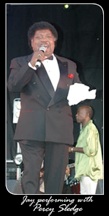
I really like Bette Midler’s version of When a Man Loves a Woman when she performed it in the movie The Rose. She sings it with so much passion, so much soul. But what’s so incredible to me about that song is that it’s written by a man.
(laughs) It was only two years ago the last time I backed up Percy Sledge, at Jamaica Day. He’s a diabetic now, but he still performs to this day. Many artists contact me to back them up when they come to Toronto. Once upon a time, Derek Andrews from the Toronto Blues Society called and asked if I’d heard of Roscoe Gordon. I was like, “oh man, Roscoe Gordon was one of my idols as a kid back in Jamaica!” Roscoe Gordon is the main reason we have reggae music. Not only that, but Roscoe Gordon was an original artist from Sun Studio in Memphis. I put a band together and backed him up at Harbourfront, and what an experience! He died two years after.
And aside from backing these artists, you covered many of their songs with your own band.
Oh yea, the songs mean a lot to me. They brought me a long way! It’s why I’m such a collector. When I go into a record store and I see an album lying there reaching out like a bird with a broken wing, I buy it and take it home. I fix up the jackets with tape and clean and polish the vinyl. I’ve never parted with any of my records. Where I come from, it’s how we appreciate the artist. If not for them, I wouldn’t be here. Over the years, I’ve tried to incorporate the material of great artists into my repetoire. When people come to see Jay they’ll hear artists like the Temptations, who had David Ruffin, one of the best singers in the business. But for me, the greatest singer of all time, male or female, is Aretha Franklin.
I hear Aretha Franklin is going to be doing a free show on the streets of Toronto during the Jazz Festival this summer.
I’ve seen Aretha perform before, but I would like to go to that. I’d really like to meet her.
But who would be your favourite male artist?
Aretha! (laughs) No, there’s quite a few male artists I like... Sam Cooke, Jackie Wilson, Al Green, Teddy Pendergrass.
When I saw you at the Soul’d Out show with Grant Smith a year or so ago at the Estonia House, did you not perform If You Don’t Know Me By Now?
I do cover that song, but I performed Curtis Mayfield’s People Get Ready at the Estonia show.
Perhaps it was Grant that covered If You Don’t Know Me By Now. But I do remember it sounding really good.
That song is a jewel. A-mazing! God bless those artists. And the great artists that come out of Toronto.
In the recent Bruce McDonald documentary, Yonge St: Toronto Rock and Roll Stories, they talked about an obscure artist, a transvestite.
Jackie Shane! Just last Saturday night I sang his song, Any Other Way.
I had never hear of Jackie Shane before, although the song was familiar.
I’m glad that documentary came out. Jackie Shane was a killer singer man.
He seems to have garnered a lot of respect from musicians in the Toronto community.
It was about a year and a half ago I found his album again in my collection, Live At The Sapphire, and it was heaven hearing it again. The Sapphire Tavern was a club in downtown Toronto.
What were some of the other bars you played or saw music at back in the day?
The Brown Derby, the Broom and Stone in Scarborough, and the Masaryk Hall, just off Queen St, where I saw Grant Smith and the Power open for Junior Walker and the All-Stars! Oh man!
You know, when people ask me where to go in Toronto to hear really good reggae music, I never have an immediate answer. For a while it was the Bamboo Club, which is long gone now, but it doesn’t seem like there’s ever been a real live music circuit in Toronto for reggae.
It’s unfortunate about the Bamboo. When that place closed, it was a tremendous blow to the reggae community. Toronto is the last frontier for reggae, but to bring it back to the forefront it needs to be approached in a different way. I’m doing my best to bring it back and have people respect reggae music the way it needs to be respected. People can come see me, Jay Douglas, perform soul music, lover’s rock, and good reggae music at Snug Harbour in Mississauga. It’s right on the water at Lakeshore and Hurontario. I’ve been performing there for 11 years now, every Friday and Saturday night. We play ska, rock steady reggae, and soul with a four-piece band from 8pm till midnight. I’m there most weekends, but it’s best to call ahead as there are occasions when I get called away for another event. Like just now I was in the UK, but my band still played Snug Harbour with a different singer.
So how many recordings do you have now?
I have about seven cds available.
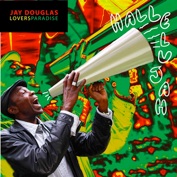
And your latest recording, Lovers Paradise has a version of Leonard Cohen’s Hallelujah. Tell me about that.
My recording of Hallelujah has been my biggest piece of cake in life so far. Sandra Whiting from Sandra Whiting and Associates put a Leonard Cohen’s greatest hits cd in my hand one day and said, “Now pay attention. There’s a song on there that you should cover”. When I heard Hallelujah, I knew I had to record it. But after discovering it’s the most covered song in the world, I decided to do it reggae-style, because no one had done that yet. I had to go to Jamaica for a funeral, and when I found myself at the Kingston airport with something like eight or nine hours to kill, I phoned up some of the top musicians I know there, the Fab Five, and they came and picked me up. We went into the studio and laid down the track for Hallelujah in time before I had to be back at the airport to fly to Canada.
Wow.
It was mixed and mastered here, but in England it sounds much more expensive on the radio, than here! (laughs) The recording of Hallelujah and the video we made for it has done wonders for my career. I get comments from all over the world. Thank God for Leonard Cohen.
And you’ve performed all over the world, haven’t you?
Yes, I had one of the top booking agents, Charles Rodriques. One time Charles said to me, “I’ve been sending guys to Hong Kong and they’re not doing well, causing me problems. If you go to Hong Kong, I know Margaret and I can sleep happily at night. (laughs) So I went. And I went to Hong Kong five times after that, staying four months at a time. I’ve played the Mediterranean and the Caribbean. When I was working for the Sheraton, I played Beijing for a month. I played on cruise ships. I was offered to play a resort in Australia while I was in Hong Kong, but stupid me, I got home sick and came back to Canada. A week later I was sorry I hadn’t taken the offer. But then Charles sent me to Portugal, to the beautiful island of Medeira. Imagine what it was like for me to play there on New Years Eve!
When was this?
In the 80s. And I did the cruise ships for five months at a time all through the 90s. You have to really want to be in show business when you work the cruise ships. It takes a lot of discipline. I wouldn’t mind doing cruise ships again, but they won’t take me for just two weeks. I would have to go for much longer, and I don’t want to leave Toronto for that long.
What keeps you in Toronto?
Recording, writing, creating. I have the Snug Harbour gig and I do corporate events. And sometimes my keyboard player and I go into the senior’s homes and give back to the community. You should see what the music does for the seniors when they hear Jay singing. They come alive! One time, a guy jumped up from his wheelchair and the nurses freaked out! (laughs) “You see that! Oh my god, look what you done Jay!” (laughs)
I finally visited the Rock and Roll Hall of Fame in Cleveland last week, as I told you earlier. But I’ve yet to visit the Motown building Hitsville USA in Detroit. Have you been there?
Oh yes, twice! They get a lot of tourists. It’s a semi-detached house with an upstairs and downstairs. It was very moving to go in to the studio; the recording studio they called the Pit. To reach the world, Berry Gordy would make sure you sang well. He made you work hard. Gladys Knight would later say, “it was the pit of hell”. (laughs) All the equipment and instruments are still there, and you’re asked not to sit on it, but the couch that Marvin Gaye used to sleep on is still there! I was very impressed.
And what about the music business now?
Well, this is a very touchy subject for me. I’ve worked very hard. Many of us have, like Everton Pablo Paul, the original drummer of the Cougars, Jackie Richardson... we got this gift from God and we don’t horde it, we share it. And we’re still sharing it. All of us, Grant Smith, George Olliver... Many of us were under paid, but we didn’t let that stop us. There are some who have their own agenda, for whom the money comes first. We know who the fakers are, but we just bless them. For many of us, the music is in our hearts and we’re honest with it. We know it’s not ours to keep, and we’ll share it until we go to the next life.
And one of the places many of the artists you mentioned would share it was at the Chick n Deli, which just recently closed down.
After the Cougars broke up, I was with a band called Unity and played the Chick n Deli for many years. I remember line-ups coming out of that place. I knew the owner Jack Brewer, who’s brother Carl was a hockey player with the Toronto Maple Leafs. At one point in time, there was no other establishment in Canada like the Chick n Deli. It was a mint. They kept live music going. It is so unfortunate that it closed.
The last time I played there was about a year ago, as Robbie Lane’s guest at the Sunday night jam.
Do you get back to Jamaica very often, and if so, what’s Jamaica like these days?
This past winter, Jamaica had one of the highest rate of tourists coming in. Not only that, but two weeks ago the world’s largest cruise ship was in Falmouth, the new seaport that’s about twenty miles out from Montego Bay.
If I get to Jamaica again anytime soon, I want to go to Kingston because I only did Montego Bay and Ochos Rios before. I want to see the Tough Gong recording studio and Bob Marley’s resting place.
Bob Marley’s resting place is in St Anne’s. And you can go to the place where Bob Marley got his honey; the bee’s nest where he got his honey is still there, at Hope Rd.
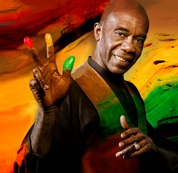
What about Rastafarianism? Do you believe in any of that?
I don’t believe Selassie is God. He’s a man descendant from King Solomon. And there’s a big difference between dreadlocks and true Rastafari. Most people with dreads like Whoopi Goldberg, that’s just fashion. I don’t think I know it all, and I’m not hear to judge anyone, but a true Rastafarian respects the land and the enviornment. I respect true Rastafarians for their diet; the Rastas who live off the land in the hills of Jamaica. They’re not into microwave. They don’t believe in pollution; pollution of the mind, you know? They don’t believe in putting their faith in man. But you have to go a long way to find a true Rastafarian, to know what they’re thinking and how they see things.
When I was in Jamaica, I looked for that real Rasta way of life. The closest I came was when I was taken into the hills of Montego Bay for a cook-out and there was a power failure. I was the only white person in the village. The two Jamaicans that took me there said we had to go find the Rasta to flip the breaker. Driving down a dirt road in what seemed to be in the middle of nowhere, we came to a sudden stop, and I got a little anxious. I mean, there was no power remember, and it was so dark. Next thing you know, out of the pitch black comes this 6 ft 5 Rasta in full colours and dreadlocks! He was beautiful, but scary too. I didn’t understand the patois that was spoken, and I never felt so foreign. Unfortunately the power wasn’t restored and the cook-out didn’t happen, but back at the village, I was fortunate to experience how Jamaican families spend Christmas when we porch hopped by candle light. I loved every minute of it.
It wasn’t by coincidence why I was born there, in Jamaica, one of the most beautiful countries in the world. We’re all spiritually connected, all God’s children, but for those unfamiliar with the Rastafarian movement, it can be very intimidating. The look you talk about represents the male lion. But behind it all, the people are bless-ed.
I also got to spend the night in a Jamaican home; with a big gate at the end of a dirt driveway. I woke up in the morning to a rooster crowing, and I absolutely loved it.
(laughs) That’s our alarm clock and we know exactly what time it is! (laughs) I go back home twice a year, and it’s still like that.
I often wonder what some of the great artists who’ve died would think of today’s world.
I can not get up and say, “I’m going to be a peace activist”. It’s not my way. Jesus walked the land and took lot of abuse, but to this day, they call his name. The only thing wrong is that they took his teachings, organized it, and gave it a different name.
So you are not a follower of any organized religion.
No, I’m a spiritualist. I was born and raised a Methodist, but you can’t give me that now. When you worship God, you worship him in spirit and in truth. And God is the spirit that dwells within us. And the body is the temple for the spirit that never dies. Even when man pass away, you can’t stop it. And we’re all connected. It’s not by coincidence that you and I are talking right now.
So you believe there’s a reason behind everything?
Yes. There’s a bigger force that controls us, and we tap into that energy. I cannot pray to that guy up there to give me power to bomb or kill you. What kind of God would that be? But I believe there are principals. I believe that whatever I do, say, or think are choices that have consequences. If I do you wrong, I would be a fool to think I am gaining over you because there are laws of karma. Cause and effect. What you sow is what you reap. Whatever you do, do in a positive light and your harvest will be abundant. And the good you do will live after you.
Today is voting day.
And I will vote because I have the right to exercise my vote. But I feel very bad for a lot of them. Most of them are so bankrupt of ideas. Why I say these things? I’m sorry, I don’t want to upset anybody, but many of us choose to live in the false world. We have to lead by example. Statistics show that old people don’t change their ways, maybe two out of ten, so we have to teach the children the most important things in life from the time they are conceived and for the next six years. Whatever we teach and give a child, that’s the future. The child is the future. We have a challenge here, because living in truth is hard for a lot of people. The answer is within. If you let yourself be dictated by society, you become a victim. If you put a lot of faith in man, you better be ready for what you get back. You have to be careful of the choices you make, because the consequences will face you. Then again, if we don’t make mistakes that mean we’re not living. But we must learn from our mistakes.
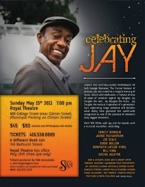
With the upcoming event at the Royal Cinema on May 15, what can people expect to see?
You know, I never worked at the Apollo Theatre in New York. It’s one of my wishes and I hope to do it. But when I started out as a young man in Montego Bay, the place we did some of the talent shows was at a place called the Palladium Theatre. Starting out in theatres is quite an experience and it brought me a long way. So I’m really looking forward to this tribute at the Royal theatre, the same place the Buena Vista Social Club perform when they are here. And to work with some of the best artists from the Caribbean and from Canada, getting together in one beautiful magical way, that’s love, that’s love! Jackie Richardson who’s not only an original member of The Cougars, but Canada’s First Lady of Gospel, Jazz and Blues, will be joining us! And Ernest Ranglin will be there! Ernest Ranglin! Ernest is well known for his session work at Studio One in Jamaica. He taught Bob Marley some guitar back in the early days, and he played on the song My Boy Lollipop. Ernest Ranglin is heavy, man, heavy! Another great thing about the show is that proceeds will go toward the J.C.A. Scholarship Fund (the Jamaican Canadian Association). I’m very honoured they’re doing this special event for Jay Douglas.
Jay Douglas
The Royal Cinema
Jamaica to Toronto (soul funk and reggae 1967-1974)
http://lightintheattic.net/artists/10-jamaica-to-toronto

About Lisa McDonald: Otherwise known as Live Music Head, Ms McDonald is a vegetarian who practices yoga and pilates, but it’s an enormous passion for music that keeps her tapping away at a keyboard. A freelance music writer living in downtown Toronto, Lisa is currently in conversation with musicians and entertainers, and publishing articles at web-based magazines. She may be contacted at: livemusichead@yahoo.com

INFO & LISTINGS BY: VENUE BLUES (TBS) ROCKABILLY 905 MISS. AREA STT FAVOURITES


